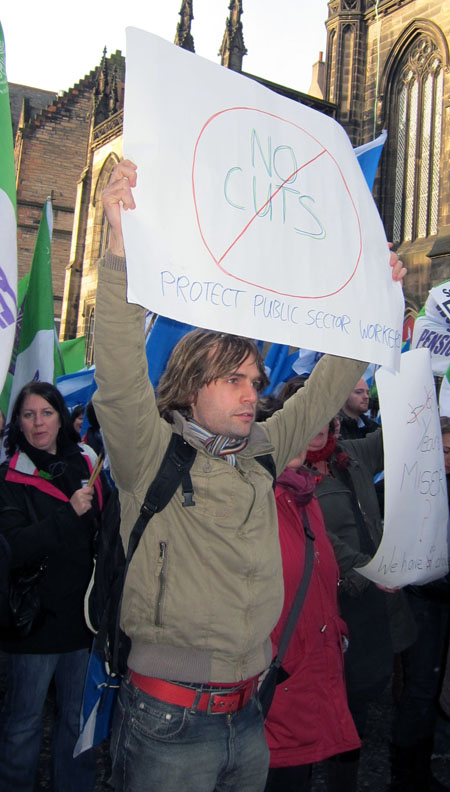Strike, Occupy, Resist
Editorial. November 30th 2011 may go down in history as the day that British trades-unions stopped the long retreat that began with the defeat of the miners in 1985. But the announcements of the previous day by the Tory-Lib Dem coalition make clear that there will be many more fight to come.
Faced with increases in pension payments, changes to pension calculations which would make most pensioners worse off and maybe worst of all, the increase in the pension age to 67, unions across the public sector took unprecedented strike action. Local government, the civil service, the NHS, teachers and lecturers were among the staff who took industrial action. More than two million workers joined the strike. Most schools shut, hospitals were reduced to a minimum service. The government were even forced to ship in senior civil service managers to keep Heathrow airport passport control functioning.
The Tory Daily Mail had an online poll to gauge support for the strike. It was 84% in favour of the strikers. Mysteriously it vanished from their website. The government could not quite get their spin right. Minister Frances Maude slammed the strikers for the widespread disruption whilst PM David Cameron called the strike a "damp squib". Make your mind up! There was no doubt in the minds of those who joined picket lines, marches and rallies in their tens of thousands. Glasgow and Edinburgh saw the biggest demonstrations for decades. Edinburgh's Royal Mile was a sea of union flags and banners as the demonstration completely filled the historic old town.
Biggest Cuts in History
The previous days announcement from the government promised devastating cuts to come. The utter failure of Chancellor George Osborne's 'plan A' was clear in the stagnant growth rate of the economy. The continuing crisis of capitalism being played out in the Eurozone had eliminated hopes of export-led growth. Not being in the euro gives sterling more flexibility in making exports competitive, but not if your potential customers are bankrupt. The Tories announced £30 billion of cut with more than 700 000 job losses in the public sector. Tax credits for low income families will also be cut. All of this to fund capital spending.
It is not the rich or the bankers who are being asked to pay for the crisis but the very poorest families in society with tax credits being slashed. So much for "making work pay"
The Tory plans are highly ideological. Although pension costs are actually coming down, according to the Hutton report, they are targeted for cuts. It is not the rich or the bankers who are being asked to pay for the crisis but the very poorest families in society with tax credits being slashed. So much for "making work pay". It was the junior partners in the coalition, the hapless Liberal Democrats who showed up on Newsnight to defend the moves. When asked if the Lib-Dems intended to go into the next election with a manifesto pledging billions of pounds worth of cuts, Treasury spokesman Danny Alexander replied "I'm afraid so".
So, although the beginning of the fightback on N30 was magnificent there is clearly a long way to go and many more struggles to fight.
The Way Forward
Firstly it is vital to continue the momentum of the strikes. Millions of workers have seen their power and confidence in the class struggle is being rebuilt. The message is beginning to get out that ordinary workers should not have to pay for a mess that the bankers and the rich caused.
With millions of pounds of cuts proposed, trades-unions and community groups must work closely together with service users in united opposition. They should reach out to the new wave of anti-cuts and anti-capitalist protest in the student movement and the Occupy movement. Local councils and the Scottish government should be challenged to refuse to implement cuts and to defy the Tory-Lib Dem government.
Only by being bold, being audacious and being militant can we hope to win. Strike! Occupy! Resist!
